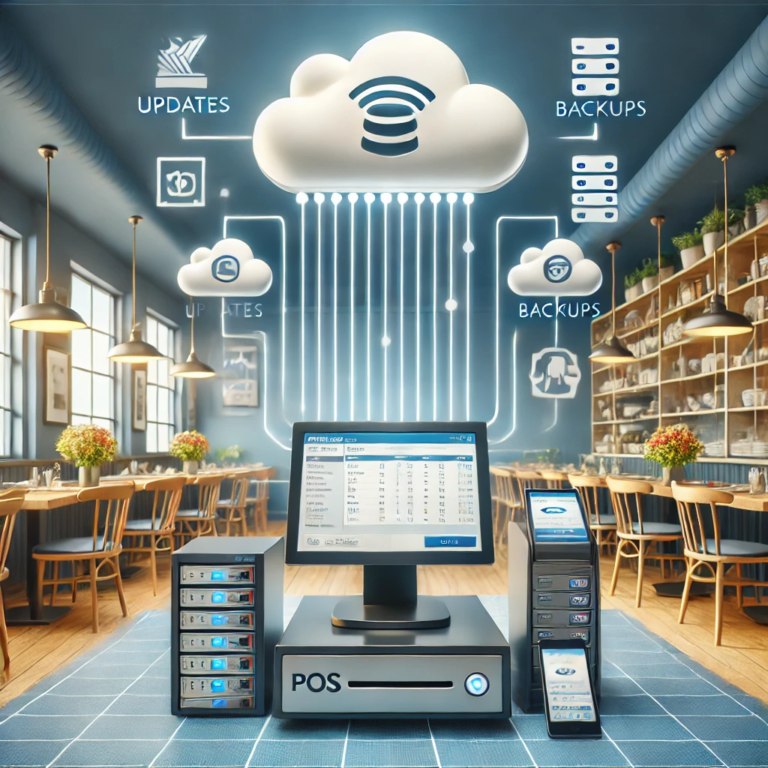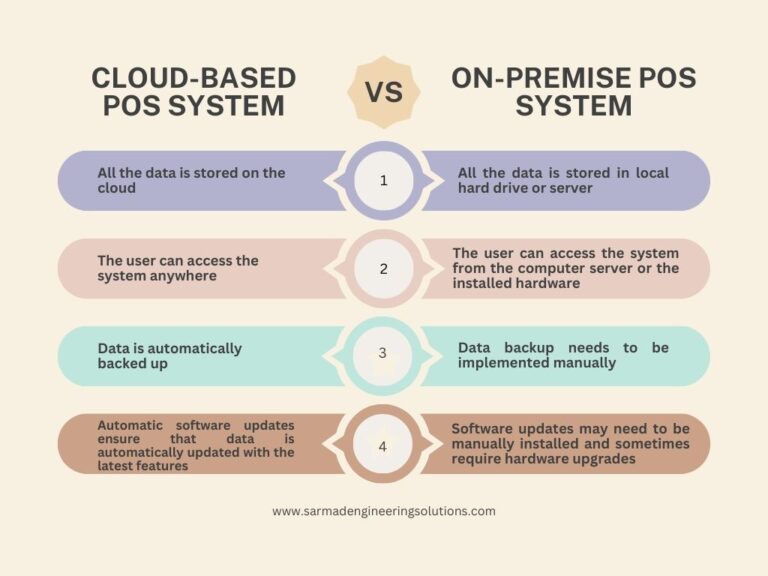
In today’s constantly evolving business, selecting the right point of sale system can improve business performance. The decision to choose a cloud-based POS and On-premise system is important, whether you are running an independent café or a multi-location retail business. Both systems offer potential advantages and drawbacks that can significantly impact the business operations.
With the revolution in POS technology, cloud-based and On-Premise POS systems have become the prominent choices for businesses. If you are interested in running any retail business in this revolutionary era, it is important to purchase an efficient POS system. It will make transactions smooth, maintain inventory management, report and analysis of data, and more.
So, Cloud-Based and On-Premise POS Systems are two potential outcomes in the point of sale technology. Both systems carried out the same functions with a few differences. Thus, before purchasing software, take a close look at how your business runs daily- help to figure out which system makes sense. This article will be helpful to understand which system is better, which should be chosen, and which will operate well for your business.
How Cloud POS System Work?

Cloud-based software is a type of POS software in which all data is stored in an online server and can be accessed anywhere through an internet connection from any device. This makes it convenient to access data at any time, with no need to install or purchase any hardware. It is a highly convenient software that allows you to pay a monthly or annual fee to use the server, which can update, back up, or provide support for all your data.
Cloud POS: What Makes it a Small Choice
The following benefits make the cloud point of sale system unique:
1. Remote Access
Cloud-based software can be accessed remotely. You can access your data and system anywhere in the world. The relevant user is not present at the store; he can handle all the situations, i.e., sales, purchases, and any kind of problem outside the store and anywhere in the world by using cloud-based POS system.
2. Accuracy
Cloud-based software enhance accuracy in business operations by;
- Automated data entry
- Syncing across devices
- Real-time updates
- Giving regular updates and bug fixes
- Making the system centralized
3. Scalability
Another key advantage of cloud POS software is scalability. It allows to easily adjust the storage capacity based on business needs. You can add more devices, locations or users if you want to run the business in more locations without the hassle of installing hardware.
4. Data Security
All business transactions can be easily secured online in the cloud using various methods including;
- Automatic cloud backups
- Data encryption
- Remote lockout and device control
- User access control
- Activity logs and monitoring
5. Efficient Inventory Management
Cloud-based POS systems streamline inventory management by automating data entry. All data is computerized by POS and give relief to manual input. Manual data entry consumes more time and makes errors. But cloud POS stores all data in its server.
6. Budget-Friendly
Cloud-based software is economical. You don’t need to install any hardware or software, as they are hosted on remote servers. You only pay monthly or annually for services you want to use within the limited budget.
Cloud POS: Potential Challenges
Potential challenges of Cloud-Based POS software are:
1. Dependency on the Internet
If internet dependency is a positive point for cloud software it is a drawback for it. Without the internet, you can’t access your POS. Any internet issue may affect business operations, customer dissatisfaction, and lost sales.
2. Inability to Customize
Customization of cloud systems is difficult because it is done with features defined by the providers. This means you can’t customize your system to meet your business needs.
3. Limited Customer and Technical Support
Customer or technical support is limited in cloud-based POS systems. Although 24-hour mobile support is available, if the system breaks down, there are fewer chances of immediate help, especially if the support team is located in a different time zone.
4. Cost
While POS software offers a cost benefit, it also has some drawbacks. Over time, the monthly or yearly subscription fees may increase, especially for those businesses that have multiple points of sale. These rising costs can add up and impact long-term budgeting.
5. Reliability On Third-Party
Businesses depend on a third-party provider for more updates, such as system maintenance and technical support. These updates can be erupted if issues occur with the provider.
How Traditional POS System work?

On-premise software is traditional software, sometimes called legacy software, in which all data is stored on a local server, especially on your computer’s hard drive. There is a need to purchase and install the hardware and software and handle all the data, security, and backups. This data is only accessed when you open the computer or drive.
Why some Businesses Prefer On-Premise POS?
Many entrepreneurs prefer on-premise POS due to the following plus points:
1. Internet Independence
There is no need to access the internet in On-premise software. All the data can easily be accessed when needed and is already installed on the computer.
2. One-Time Payment
A one-time payment is required in the on-premises system. When payment is made, all the data can easily be accessed and become your own.
3. Complete Control of data
All the data is under the control of the user. There is no third-party provider’s role in storing and managing all data.
4. Customized Feature
As all the data is in the control of the user, additional features and functions can be provided according to the needs of the business demand.
5. Offline Functionality
As it is internet-independent, all the functions occur offline. You can make transactions if your internet goes down.
6. Reliability
On-premise is a resilient and secure software that can operate without internet access- eliminating data errors and enabling consistent performance.
Common Problems with On-Premise POS Solutions:
Some challenges are faced with the use of on-premise pos:
1. Lack of Mobile Optimization
Internet independence is sometimes the drawback of an on-premise system. Because you can’t access it anywhere in the world. It is only available when the user is on the terminal. So there are fewer chances for business advancement.
2. Expensive to Implement
As there is a need to purchase additional hardware compatible to your point of sale system. This seems to be expensive for many entrepreneurs.
3. Limited Flexibility
On-premise software offers limited flexibility as it can only be accessed from where it is installed. So businesses can’t manage operations remotely.
4. Limited Features
According to the changing technology and customer needs, On-Premise systems are limited in features. These few features hinder the business’s growth. Modern POS systems have more advanced features which allow businesses to customize their point of sale systems.
5. Manual Updates
One of the biggest disadvantages of an On-Premise system is the need for manual updates. The businesses need to ensure that the system is updated with the latest features and security patches.
6. Data Loss
All data is stored in a hard disk or computer server. If any mishap occurs, such as the server being damaged, theft, or physical damage, it results in loss of sales or customer dissatisfaction.
Conclusion:
In general, both types of software are used in businesses according to the demand of the business. Cloud-based software has new features, and popular and on-premises software offers features that are suitable for customized POS systems. Therefore, retailers should carefully evaluate their business needs, demand, and growth potential before choosing any type of point of Sale system.

